Meta and VSParticle launch first and largest open-source catalyst database to accelerate clean energy transition
- New partnership sees Meta leverage VSParticle synthesis technology to build the largest open-source experimental catalyst database of its kind.
- In only a few months, 525 materials were synthesized from a diverse range of elemental compositions to discover materials to combat climate change.
- VSParticle has growing interest from other AI companies to create bigger experimental datasets needed to enable material discovery.
Delft, 19th November 2024: In a bid to accelerate our transition to clean energy in our fight against climate change, VSParticle (VSP) – the leading innovator in the scalable synthesis of nanoporous layers – is today announcing the first results from a landmark collaboration with Meta’s Fundamental AI Research (FAIR) team, and the University of Toronto (UofT).
The collaboration brings together VSP’s state-of-the-art nanoporous layers printing technology, with UofT’s testing platform and Meta AI’s models, to rapidly produce, print and test the next-generation materials needed for clean energy technologies. Through its first Open Catalyst Experiments 2024 (OCx24), the collaboration has identified, synthesized and tested hundreds of electrocatalysts that are critical for clean energy solutions, and in doing so has built the first and largest open-source experimental catalyst database.
This is a critical milestone needed to help turn today’s AI-driven predictions into scalable, real-world products, yet, before this collaboration had proved impossible. The findings mark a major breakthrough in bridging the gap between computational models and experimental studies, bringing us closer to viable clean energy solutions at scale.
“Through this collaboration, we’re breaking new ground in material discovery. It marks a significant leap in our ability to predict and validate materials that are critical for clean energy solutions. The results we’re seeing with electrocatalysts demonstrate the real-world potential of AI in addressing urgent climate challenges.” Larry Zitnick, Research Director at Meta AI
Cracking the electrocatalyst code
Electrocatalysts are critical to decarbonizing industries and achieving global climate targets due to the role they play in clean energy processes like carbon dioxide reduction reactions (CO2RR), hydrogen production and next-generation batteries. To accelerate the discovery of these catalysts, Meta’s FAIR team has been developing AI models to identify candidates for energy conversion processes in hours, rather than months. However, translating these predictions into scalable applications remains a complex challenge, typically taking up to 15 years. At the same time, training AI models to predict the best electrocatalyst materials requires large and diverse experimental datasets which simply don’t exist today.
To bridge this gap and accelerate the path of discovery to manufacturing, VSP, Meta and UoT came together to test datasets of hundreds of unique and diverse materials in the lab – creating the open-source database. Using a process called spark ablation, the VSP-P1 nanoprinter synthesized 525 materials that AI had predicted as the best candidates for CO2 Reduction Reactions (CO2RR) by vaporizing each one into nanoparticles.
These nanoparticles were then deposited as thin, nanoporous films and shared with the University of Toronto where its high-throughput pipeline tested how well each one performed under a range of industrial conditions. VSP’s unique nanoparticle approach gave researchers greater control over particle size and composition, with the high levels of automation and speed needed to create nanoporous materials at the scale required. Other technologies would need decades to synthesize such a high number of new nanoporous materials, which would have made the project impossible.
The findings were fed into an experimental database, from which researchers were able to validate the AI predictions against real-world results; identify hundreds of potential low-cost catalysts for key reactions; and which can now be used to train and further refine the AI and ML predictions. Next to building the largest experimental dataset, the project ran a record 20 million computer simulations – the largest computation of its kind to date – which can now be used to build even larger databases for scaling up the processes.
“By producing unique electrocatalysts at unprecedented speed, our partnership with Meta and the University of Toronto is not only helping to validate years of theory, but it’s shortening the discovery-to-application timeline; clearing a bottleneck that has held advanced materials back for decades. We have the only technology worldwide which is capable of delivering such a high number of unique nanoporous materials in a short period, to bring to life the vital work of Meta and UoT. Together, we’re proving that the materials needed to power this next generation of clean energy systems can be discovered and deployed at a pace that meets the urgency of the climate crisis.” Aaike van Vugt, co-founder and CEO of VSParticle
To really crack the code for material discovery, AI models need to be trained on a much larger experimental dataset of between 10,000 to 100,000 unique tested materials. Since VSP’s technology is the only technology that could synthesize such a large number of thin-film nanoporous with high electrocatalytic performance, the company is working with many more organisations, including the Sorbonne University Abu Dhabi, the San Francisco-based Lawrence Livermore National Laboratory, the Materials Discovery Research Institute (MDRI) in the Chicago area, and the Dutch Institute for Fundamental Energy Research (DIFFER).
Alongside this project, VSP has been scaling up its own technology to be faster and more efficient in the future. The current VSP-P1 printer is powered by 300 sparks per second, but the team is also working on a new printer that would increase this output time to 20,000 sparks per second, which could supercharge this type of research even further. In particular, this would enable it to scale its core technology to support green hydrogen production through printing the necessary components for the porous transport electrode, something industrial customers are requesting. This means VSP will be able to reduce current production costs by 85%, through using fewer pieces of equipment, less energy and more automation, making it the most cost-competitive production technology for this critical aspect of green hydrogen production.

Get access to the detailed analysis of alloy catalysts datasets synthesized with VSParticle technology for Meta's Open Catalyst Experiments 2024
Press Articles
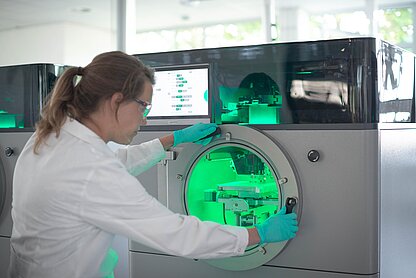
November 25, 2024 - Insider Monkey
Meta Platforms, Inc. (META) Partners with VSParticle and University of Toronto to Advance Clean Energy Solutions Using AI and Nanotech
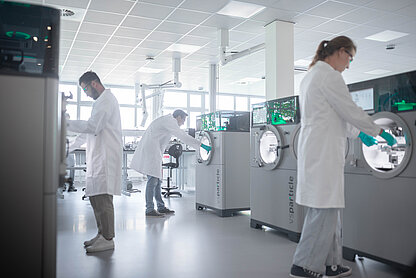
November 25, 2024 - Yahoo Finance
Meta Platforms, Inc. (META) Partners with VSParticle and University of Toronto to Advance Clean Energy Solutions Using AI and Nanotech
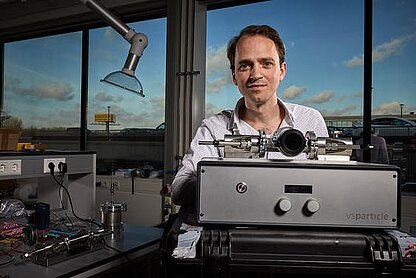
November 23, 2024 - BNR
Deeptech company VSP closes mega deal with Meta: ‘We can become bigger than ASML’

November 21, 2024 - EE Times
Meta, VSParticle Launch Database to Drive Clean Energy Innovations
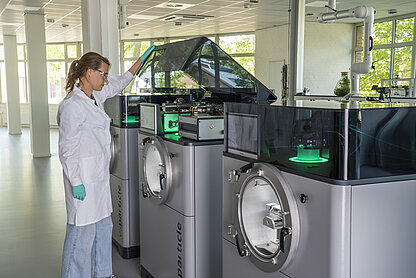

November 20, 2024 - Link Magazine
Meta and VSParticle launch the first and largest open-source catalyst database to accelerate the clean energy transition

November 20, 2024 - ICT Magazine
VSParticle and Meta collaborate on materials for energy transition
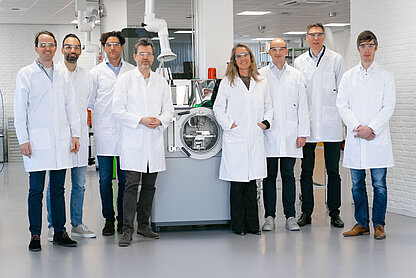

November 20, 2024 - Scientific Computing World
Meta and VSParticle launch catalyst database to accelerate transition to clean energy

November 20, 2024 - Bits&Chips
VSParticle partners with Meta to speed up cleantech material development

November 19, 2024 - TNW
Nanoprinter turns Meta’s AI predictions into potentially game-changing materials

November 20, 2024 - SiliconCanals
Delft-based VSParticle partners with Meta; uses AI to synthesise 525 new materials that can help fight climate change
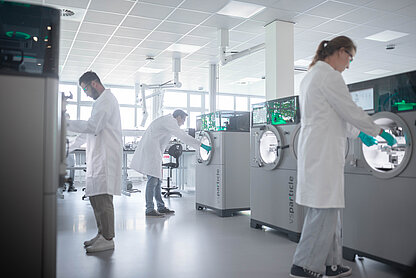
November 20, 2024 - Quantum Zeigeist
Meta and VSParticle Unveil Breakthrough Catalyst Database for Clean Energy

November 20, 2024 - AI Hunt
Meta and VSParticle Revolutionize Nanomaterial Synthesis for Clean Energy!

November 19, 2024 - De Telegraaf
VSParticle from Delft finds green ally in tech giant Meta: 'Giving energy transition a huge boost'

November 20, 2024 - Inside HPC
Meta FAIR and VSParticle Launch Catalyst Database Designed to Accelerate Clean Energy Transition

November 19, 2024 - Het Financieele Dagblad
Delft deeptech company VSParticle achieves crucial milestone with Meta

November 20, 2024 - MT/Sprout
Delft VSParticle and Meta accelerate material innovation for sustainable energy

August 08, 2024 - TNW
Delft-based VSParticle has raised €6.5mn to accelerate material discovery for industrial solutions, such as the production of green hydrogen.
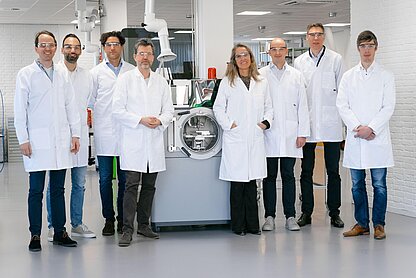
August 08, 2024 - SiliconCanals
Delft-based VSParticle (VSP), a supplier of nanoparticle synthesis and deposition tools, has secured €6.5M in an A2 extension round led by NordicNinja and Plural.

August 08, 2024 - MT / Sprout
VSParticle heeft opnieuw groeigeld opgehaald: 6,5 miljoen euro. De missie van co-founder en ceo Aaike van Vugt komt daarmee weer een stap dichterbij ...
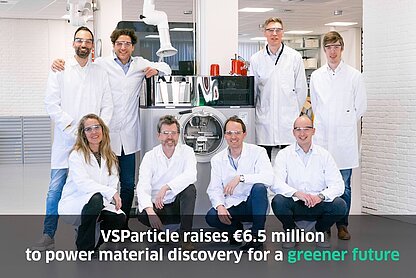
August 08, 2024 - Startbase
Das niederländische Startup VSParticle (VSP) hat in einer Finanzierungsrunde 6,5 Millionen Euro eingesammelt. Die Runde wurde von NordicNinja angeführt …

August 08, 2024 - EU-Startups
VSParticle (VSP), a leading supplier of nanoparticle synthesis and deposition tools, has raised a €6.5 million A2 extension round …

August 08, 2024 - tech.eu
VSP's advanced technology ensures top-tier material synthesis, paving the way for future innovations in nanotechnology and novel materials for the energy sector.

August 08, 2024 - FINSMES
VSParticle, a Delft, The Netherlands-based supplier of nanoparticle synthesis and deposition tools, raised €6.5M in Series A2 extension funding…

August 08, 2024 - TFN
VSParticle, a Dutch supplier of nanoparticle synthesis and deposition tools, has raised a €6.5 million A2 extension round. It was led by NordicNinja …

August 08, 2024 - M&A
VSParticle (VSP) uit Delft – leverancier van tools voor nanopartikelsynthese en -depositie – heeft 6,5 miljoen euro opgehaald, tijdens een financieringsronde …
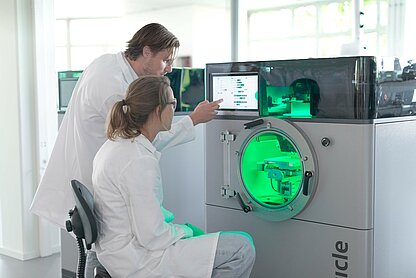
August 08, 2024 - INNOVATIONORIGINS
VSParticle, een startup uit Delft, heeft €6,5 miljoen aan financiering binnengehaald voor hun nanoprinter. Met deze technologie worden materialen afgebroken…

August 08, 2024 - Startup Weekly
VSParticle (VSP), the supplier of nanoparticle synthesis and deposition tools, has raised a €6.5 million A2 extension round led by NordicNinja and previous investor ….

August 08, 2024 - FuelCellWorks
VSParticle (VSP), the supplier of nanoparticle synthesis and deposition tools, has raised a €6.5 million A2 extension round led by NordicNinja and ...

August 08, 2024 - Zefryon
VSPARTICLE, a company specializing in nanoparticle generators for various applications, has secured €6.5M in its Series A funding round.The funds, …

August 08, 2024 - Startup Weekly
VSParticle (VSP), the supplier of nanoparticle synthesis and deposition tools, has raised a €6.5 million A2 extension round led by NordicNinja and previous investor ….

August 08, 2024 - FuelCellWorks
VSParticle (VSP), the supplier of nanoparticle synthesis and deposition tools, has raised a €6.5 million A2 extension round led by NordicNinja and previous investor Plural ...

August 08, 2024 - VENTUREBANC
Dutch-based company specializing in nanoparticle synthesis and deposition tools, raised $7M in a Series A extension round led by NordicNinja …

August 08, 2024 - INNOVATIONORIGINS
VSParticle, een startup uit Delft, heeft €6,5 miljoen aan financiering binnengehaald voor hun nanoprinter. Met deze technologie worden materialen afgebroken…

August 08, 2024 - LinkMagazine
VSParticle specialist van instrumenten voor de synthese en afzetting van nanodeeltjes – heeft een A2-uitbreidingsronde van € 6,5 miljoen opgehaald onder leiding …

August 08, 2024 - eeNews Europe
VSParticle (VSP) in the Netherlands has raised $6.5m to boost development of industrial machines for creating nanoparticles, will be used to .…

August 08, 2024 - AFN
A notable raise came from Netherlands-based VSParticle, which aims to accelerate green hydrogen production.VSParticle raises funds for green hydrogen..

August 08, 2024 - ain
The largest Japanese-backed European VC firm NordicNinjahas led a €6.5 million funding round into VSParticle, a company that accelerates the development of …

August 08, 2024 - Change Inc
De Delftse professor Andreas Schmidt-Ott, Tobias Pfeiffer en Aaike van Vugt, dan net afgestudeerd als scheikundig ingenieur aan TU Delft, richten VSParticle…

August 08, 2024 - HydrogenCentral
Delft-based VSParticle has raised €6,5mn to accelerate material discovery for industrial solutions, such as the production of green hydrogen.VSParticle’s technology…

August 14, 2024 - BITS&CHIPS
An investment with a Japanese twist enables VSParticle to increase its clout in Japan and accelerate the development of industrial-scale catalyst printers…

August 13, 2024 - High Tech Systems
VSP) has raised $6.5 million in a new investment round led by NordicNinja. The money will be used to scale up production and accelerate the development of an industrial printer…